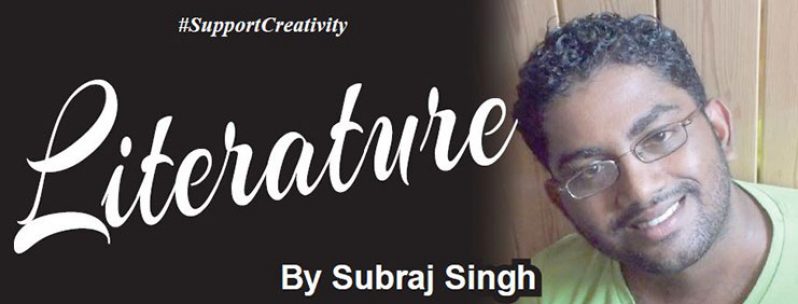JOHNAgard is one of Guyana’s best known poets. He is also one of the country’s most accomplished, as he has won, among others, the Casas de las Americas Prize, the Cholmondeley Award, and the Queen’s Gold Medal for Poetry. He is also known for his upbeat

persona and his performances of poetry, which are, like his poems, things of wonder. Agard currently lives in England, but like almost all poets from the Caribbean, his works constantly ripple with the rhythms, the speech, the imagery, and the thematic concerns of our part of the world. His poem, “Checking Out Me History” is a good example of this, and it is a fun poem to read, being not only entertaining but also interesting, informative, critical, and layered with postcolonial content.
The opening lines of the poem read: “Dem tell me / Dem tell me / Wha dem want to tell me / Bandage up me eye with me own history / Blind me to me own identity.” The one thing that is apparent even in these opening lines is the fact that Agard is using a Caribbean dialect in order to speak the poem to the reader. Repetition is not only a device used in poetry, but it is also a technique that is quite common in dialects around the Caribbean. In a poem about white history existing as an oppressive force to Caribbean history, rather than coexisting alongside or helping to emphasise or bring forth Caribbean history, the act of using the language of the Caribbean is a powerful one and Agard knows exactly how and why he writes in this particular dialect.
When Agard repeats the phrase “Dem tell me”, he is honing in on this idea of being repeatedly told something, almost to the point where it might be considered badgering or oppressive, which draws a line straight to the colonisation in our history and the neocolonisation in the modern world. Agard’s poem may be about the colonisation of history itself since the poem addresses the idea that when the history of only one of group of people is taught, then much is lost, including power, which stems from knowledge, which stems from knowing our past and present.
The poet goes on to say in the poem that “Dem tell me” about various instances that are relevant to British history, such as “Columbus and 1492” and “Florence Nightingale and she lamp”, but also includes non-historical references such as “Dick Whittington”, “ole King Cole”, and “the cow who jump over the moon.” These seemingly irrelevant references to what the persona of the poem was taught are important because they highlight to us what the knowledge, and knowledge of history, that was given to the persona means to him. By interspersing the historical with the trivial, the persona might be implying that British history by itself is as relevant to him as a nursery rhyme.
Also, importantly, is the way Agard includes important figures from Caribbean history, and laments their roles in this history and the fact these people are the ones “dem never tell me bout.” Figures like Toussaint L’Ouverture, “Toussaint / a slave / with vision / lick back / Napoleon / Battalion… Toussaint de thorn / to de French / Toussaint de beacon / of de Haitian Revolution”, and figures like Jamaica’s Nanny, “Nanny / see-far woman / of mountain dream / fire-woman struggle / hopeful stream / to freedom river” are some of the aspects of Caribbean history that Agard pulls into his poem to contrast the British knowledge that was passed on to him.
The poem is an important one because it speaks about knowledge and how knowledge itself (such as the knowledge of history) can be colonised, depending on who is passing this knowledge on to us. The poem is not so much about rejecting British knowledge in favour of knowledge of the Caribbean. Rather, it is about recognising what is important to the individual and how what might be important to someone should be given to that person because knowledge that is kept away, that is not freely given, might be crucial to the identity and existence of the person whom it is kept from.


.jpg)











